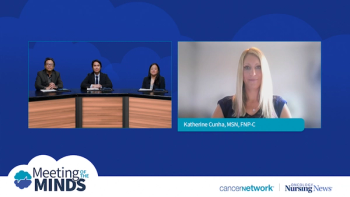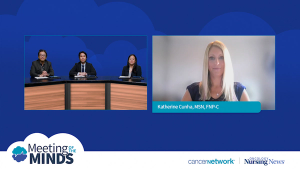Articles by Michelle Munroe, APRN

Panelists discuss how dose modifications for ALK inhibitors can significantly improve quality of life issues like brain fog and weight gain while maintaining disease control, emphasizing the importance of multidisciplinary team support including palliative care from diagnosis.

Panelists discuss how proactive monitoring for ALK inhibitor adverse effects through regular lipid panels, liver function tests, and patient education about red flag symptoms like bradycardia or cognitive changes enables early intervention and successful dose management.

Panelists discuss how the unprecedented 5-year progression-free survival benefit (60% vs 8%) demonstrated in the CROWN trial supports starting with the most effective treatment (lorlatinib) upfront rather than sequential therapy approaches.

Panelists discuss how treatment selection between lorlatinib and alectinib for ALK-positive non–small cell lung cancer should consider both efficacy data favoring lorlatinib and patient-specific factors like neuropsychiatric history or cardiovascular comorbidities that might favor alectinib.

Panelists discuss how a 48-year-old fitness instructor with ALK-rearranged stage IV lung cancer and bone metastases was successfully treated with alectinib, experiencing manageable adverse effects while returning to modified teaching activities.

Panelists discuss how managing amivantamab-related adverse events like leg edema requires understanding of underlying mechanisms (hypoalbuminemia) and may benefit from albumin infusion, dose holds, or consultation with specialists for severe cases like infected scalp wounds.

Panelists discuss how the COCOON study's advanced dermatologic prophylaxis protocol, including systemic antibiotics and topical treatments, can reduce skin toxicities by 50% in patients receiving amivantamab plus lazertinib therapy.

Panelists discuss how comprehensive patient education about expected adverse effects, combined with prophylactic measures including dexamethasone premedication and dermatologic support, helps patients successfully tolerate amivantamab plus lazertinib therapy while maintaining treatment adherence.

Panelists discuss how real-world experience with amivantamab plus lazertinib has shown remarkable responses consistent with trial data, including effectiveness in challenging cases like leptomeningeal disease, with manageable adverse effects when proper prophylactic measures and patient education are implemented.

Panelists discuss how both amivantamab plus lazertinib and osimertinib-based regimens show good central nervous system activity for patients with baseline brain metastases, with treatment choice influenced more by patient-specific factors like bleeding risk and anticoagulation contraindications than by CNS efficacy differences.

Panelists discuss how the MARIPOSA study demonstrated significant progression-free survival and overall survival (OS) benefits with amivantamab plus lazertinib vs osimertinib monotherapy, with mature overall survival data showing a 25% improvement in survival outcomes.

Panelists discuss how the treatment landscape for EGFR-mutant non–small cell lung cancer has evolved to include 3 viable frontline options (osimertinib alone, osimertinib plus chemotherapy, and amivantamab plus lazertinib), with treatment selection based on patient characteristics, preferences, and physician judgment rather than a strict algorithmic approach.

Panelists discuss how a 46-year-old graphic designer with stage IV EGFR-mutant non–small cell lung cancer and brain metastases was successfully treated with amivantamab plus lazertinib after weighing multiple frontline treatment options.



